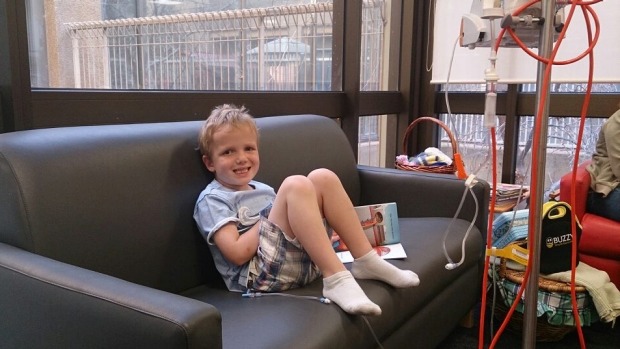
Seth Sleep: In remission from T-ALL leukaemia. Photo: Supplied
Seth Sleep was mucking around in the bath when his dad first noticed something wasn’t quite right.
It was just before Mother’s Day in 2012, and when the then five-year-old stood in the bath his dad, Simon Sleep, noticed he had a slight rash and his tummy was strangely swollen.
“We just joked about how much he had eaten,” Mr Sleep said. “Then he said he hadn’t eaten much, but I didn’t really think about it.”

Seth Sleep undergoes radiation treatment. Photo: Supplied
That was a Friday night. By Sunday he was in hospital being treated for acute lymphoblastic leukaemia (ALL), the most common childhood cancer.
Seth was unlucky enough to have a particularly aggressive subtype of the cancer, called T-ALL. It is harder to treat and more likely to relapse.
But cut forward to today and things are looking up for the eight-year-old. While he has a 60 per cent chance of relapsing, his cancer is now in remission.
And within months he is expected to finish the heavy-duty chemotherapy drugs he has been taking for the past three years that have helped cure his cancer but caused serious side-effects including difficulties with movement that his dad describes as being “like he had a stroke”.
His father Simon says he has also been given hope by the promise of a new drug being investigated by doctors at the Children’s Cancer Institute.
They have discovered how a promising new drug, PR-104, has been used safely in adult leukaemia trials and could help children with T-ALL who have relapsed.
Richard Lock, the head of the leukaemia biology program at the Children’s Cancer Institute, said T-ALL patients often had high levels of an enzyme, which his team had found appeared to switch the drug on and allow it to attack.
“If we can select patients that have high levels of [the enzyme], we think this drug will show activity,” he said.
The research team has undertaken the work using a grant from the US National Cancer Institute that aims to fast-track existing drugs into treatments.
“During the 10 years we’ve been funded under the NCI program, we’ve tested over 70 drugs and combinations, and PR-104 is one of the most exciting yet,” he said.
His research, published in the prestigious journal Blood, used mice implanted with cancers taken from children with the condition.
It found 14 of the 15 cancers tested had high-enough levels of the enzyme to trigger the drug, and Professor Lock now hopes that within a year or two it will be used in clinical trials for children who have relapsed with T-ALL.
“They tend to relapse early and quite aggressively,” he said. “We are looking to this drug to drive the relapsed leukaemia back into remission.”
But he said the drug still needed the backing of a pharmaceutical company if it were to be used more widely.
For now, Simon Sleep is just looking forward to his son living without medication. But he says the possibility of a treatment specifically targeted at T-ALL if his son does relapse gives him hope.
“If he does relapse we know he has got another option, and because it’s specifically targeted it will be a better option,” he said. “I just think that’s terrific.”
